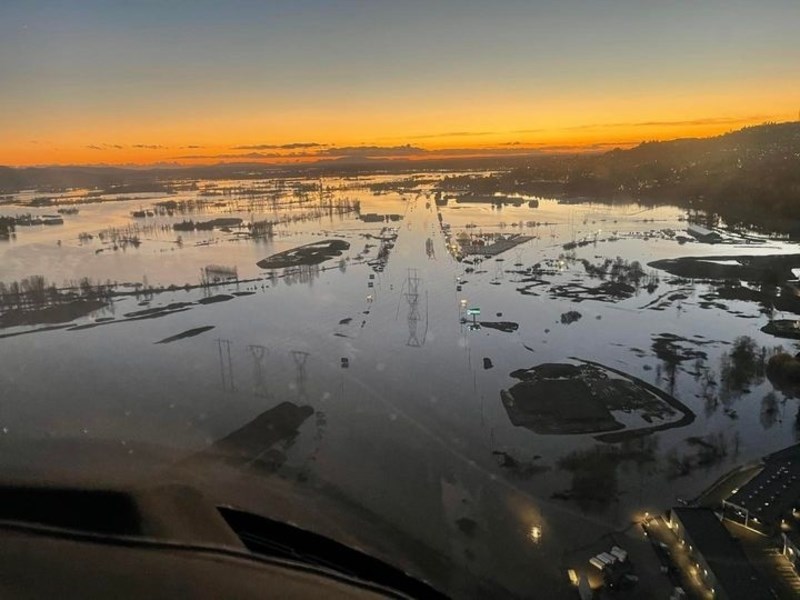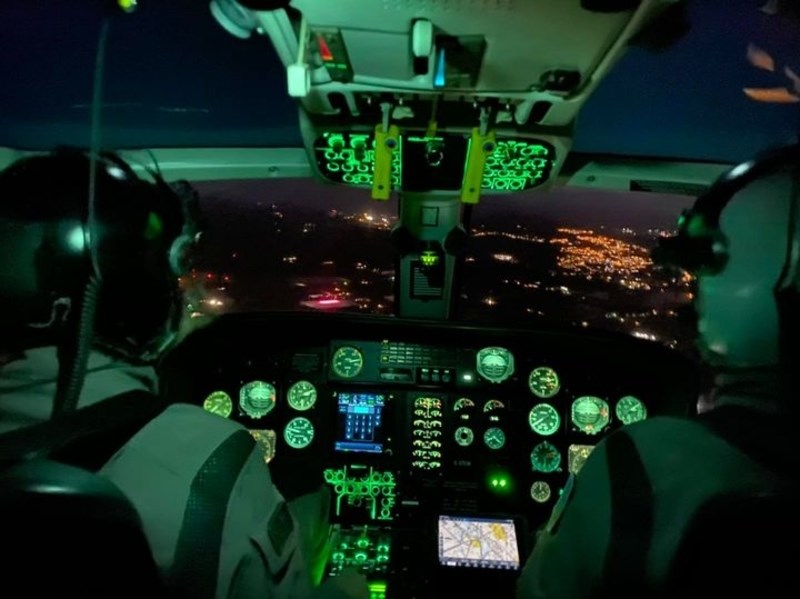After plucking 15 people and their pets from homes in two flood-ravaged communities Tuesday, a helicopter rescue team from North Shore Rescue has been back out Tuesday night and today, rescuing residents in the Fraser Valley flood zone.
A two-person North Shore Rescue team flew to Abbotsford last night with Talon Helicopters using night vision goggles and evacuated 30 people from rising flood waters.
Close to 200 people were evacuated overnight in that community after local officials issued urgent pleas for residents to leave immediately, saying the main pump station was on the verge of failing. Volunteers and staff worked through the night to build a dam around the pump station to buy more time for evacuations.
"We were the only people flying at night," said Scott Merriman, NSR search manager who was part of the night-time helicopter team.
A year ago, North Shore Rescue was approved by the province to fly and carry out rescue missions using night vision goggles – the first volunteers in Canada to have clearance to use technology previously available only to police, air ambulance and the military. The goggles work by amplifying even the smallest amount of light by a factor of 50,000.
The team invested more than $100,000 for seven sets of goggles four years ago when Talon Helicopters purchased a top-of-the-line Airbus AS365N2 Dauphin helicopter capable of flying after dark.
The team helped evacuate about 30 residents from six properties in the low-lying Sumas Prairie area of Abbotsford until after midnight. Those evacuated included children and the elderly, said Merriman. "I think they were relieved to get out."
Merriman said there were some residents who still refused to leave. Most, however, had other ways of escaping if flood waters rose - such as boats, or in one case, a helicopter.
On Wednesday morning, a three-person North Shore Rescue team flew back to the area near Chilliwack, with the same winch-equipped Dauphin helicopter and swift water rescue technicians to continue evacuation efforts.
Earlier on Tuesday, a three-person team from North Shore Rescue flew in Talon Helicopters’ hoist-equipped helicopter to Merritt, where all 7,000 residents were ordered to evacuate Monday morning after flooding caused the town’s sewage treatment plant to fail.
Key bridges have collapsed in the floodwaters and the town’s main transportation route to the Lower Mainland – the Coquihalla Highway – has also been closed by floods that washed away key sections.
Residents have been sent to evacuation centres in Kamloops and Kelowna.
North Shore Rescue’s helicopter team first flew to a home on the west side of Merritt, where a family of three and their dog were stranded, said Mike Danks, North Shore Rescue team leader, who was part of the helicopter rescue.
Seeing the damage the floodwaters had brought first-hand was devastating, said Danks. “Their home is absolutely destroyed. They’ve lost all of their belongings. We couldn’t take any of that stuff.”
Danks said the family’s vehicles had been carried away by the floodwaters. “They had a backhoe that was completely submerged in the river.”
The family were hoisted to safety and taken to the airport where they were met by teams who were directing evacuees. That was one of the most emotional moments, said Danks. “As soon as they were safe, reality hit.”
The team then flew about 10 kilometres southwest to the community of Spence’s Bridge on Highway 8 where a number of Indigenous elders and their animals were stranded by floodwaters in several homes.
“The highway was washed out in numerous places on either side of them,” said Danks. Cell service in the area is limited, said Danks, so communication had been hampered between rescuers and those needing help.
“Every property we went by there were people who were isolated.”
Some of the elders were medically frail and several had not left their homes in a long time, said Danks.
“They’d lost a huge amount of their property.”
The team ended up shuttling about 12 elders and a similar number of their animals to safety.
Danks described flying over the flooded areas as being “almost surreal, like something you’d see in a movie. There was just overwhelming devastation. Entire homes that had collapsed and washed into the river, vehicles that were in the river.”
Danks said the one bright spot was the warm welcome being given to newly evacuated residents by those providing emergency help.
The team wrapped up around 4 p.m. and flew back to the Lower Mainland, giving three people who had been stranded in Hope a helicopter ride back to Vancouver.




